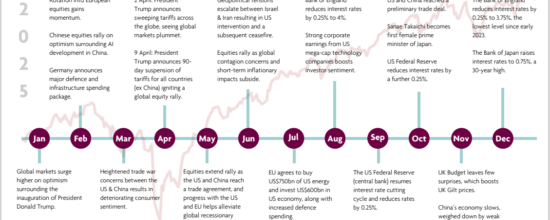Middle Eastern Conflict
Geopolitical tensions drive oil price volatility and why staying invested matters.
Following years of mounting tensions between Israel and Iran, tensions eventually escalated into direct conflict via missile warfare on 13 June, resulting in over 850 casualties. The evolving conflict led to a spike in oil prices (to the high US$70/barrel range), as investors feared impacts to supply of the key commodity.
Key concerns surrounding the conflict revolve around both the potential for Iran to close the Strait of Hormuz, one of the world’s busiest oil shipping channels, and the potential for three nuclear armed nations to declare regional war.
The initial spike in oil prices led to some investor concern due to its potential impact on inflation and fears that it could mean interest rates remaining higher for longer. Nonetheless, this concern seems to have dissipated.
Tensions in the Middle East escalated further over the weekend following President Donald Trump's announcement that the US had executed several successful airstrikes across Iran's nuclear enrichment facilities. Oil prices subsequently spiked as high as US$81.49/barrel (up from US$63.90/barrel at the end of May). Iran launched a retaliatory attack on US military bases in Qatar and Iraq. However, the US confirmed that there were no casualties, and it was largely thwarted by their (and Qatar's) air defence systems.
It must be noted that Iran pre-warned the US of these attacks, highlighting their preference to avoid a major escalation. The Iranian Parliament then approved the closure of the Strait of Hormuz; however, the country's national security council retains final right to enact this - something that experts consider unlikely. On the back of these headlines, oil prices began pulling back yesterday as markets were happy to look through the "subdued" retaliatory response of Iran and the likelihood that Iran wouldn't close the Strait of Hormuz (due to the potential for self-detriment).
Overnight, Donald Trump announced a ceasefire between Israel and Iran, which resulted in the Brent Crude oil price falling over 10% to below US$70/barrel. Markets appeared to react positively, with Asian markets up overnight and European and US equity markets up today. US Bond prices fell initially (when the conflict began) due to the expectation that rising oil prices could lead to interest rates staying higher for longer. This is because bond yields (which move in the opposite direction to bond prices) reflect investor expectations on the outlook for interest rates. However, this has proven to be short-lived - for example gilt yields have been trending downwards throughout the conflict following their initial spike (yields falling means that bond prices have been rising).

Over the past fortnight, our investment team has been continually monitoring the conflict in the Middle East but has refrained from reacting to the rapidly evolving situation. Despite the death-toll, destruction and negative headlines, equity markets around the world have largely held flat over the period (despite exhibiting increased volatility). This highlights the importance of not making rash decisions in response to negative headlines.
Times like these remind us of the importance of remaining invested in diversified portfolios that are in line with your attitude to risk. History has shown that markets are capable of riding geopolitical tensions.
Trying to time the peaks and troughs remains a guess at best. The best investment strategy remains staying invested for the long-term and investing in line with your attitude to risk. At Omnis, we will continue to monitor the situation for further developments and shall provide further updates as and when required. If you have any questions or concerns, please speak to your financial adviser.



